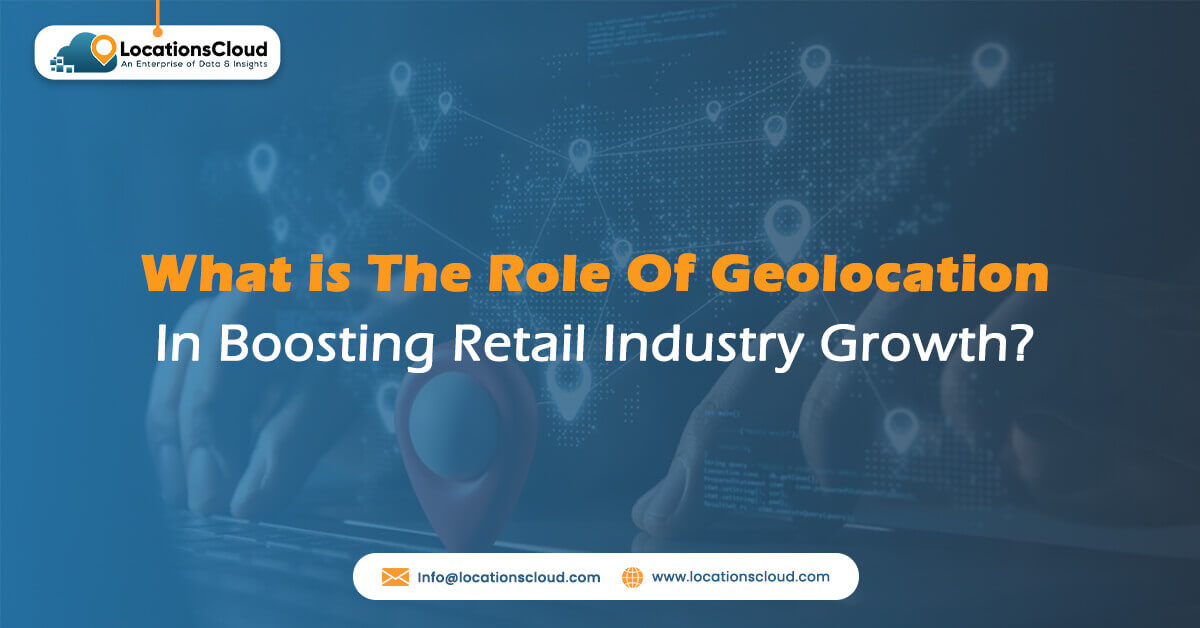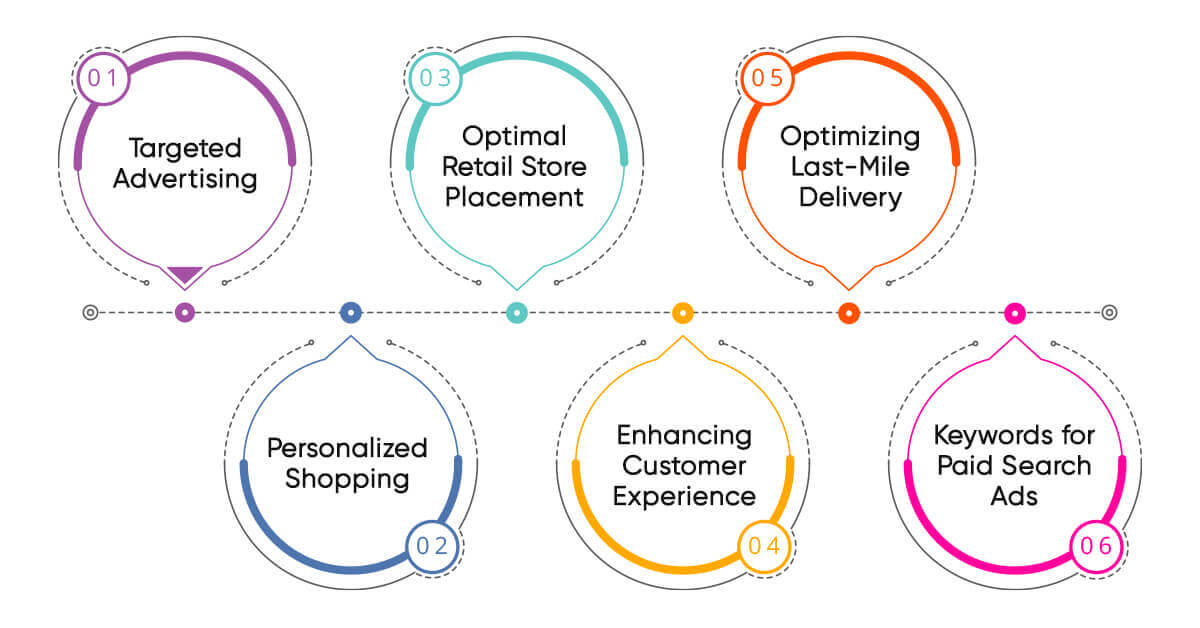
Benefits of geolocation have been apparent in retail business for a long time, helping shops analyze markets and build their physical stores. Even before the pandemic, it was hard for stores to pick the best spots while managing their physical and online stores.
But now, especially after COVID-19, geolocation use cases in new ways beyond physical stores. Firms use it for location-based marketing [Geo marketing] and real estate management. Despite talks about traditional stores disappearing, most shopping, around 85%, still happens in physical stores in the United States of America.
New facilities are underway, like last-mile deliveries. Also, firms need to find new ways to interact with customers better. As traditional mail advertising has become less prevalent, stores are now focusing on delivering push notifications tailored to a client’s location. This is because many customers are comfortable with sharing their location to get these alerts.
Things have changed in how people shop, and stores need to adapt. With new tech and rules about personal info, shops need to rethink how they do things to be different in a crowded market. Geolocation tech should be a part of everything in a customer’s shopping journey, from picking a store location to online orders and even delivering things to homes.
What Is Geolocation Technology?
Geolocation means tracking a device using GPS, cell phone towers, or Wi-Fi. Using these systems it determines a person’s location precisely, providing specific coordinates such as latitude and longitude or an actual street address. Phones and computers can both use geolocation.
Retailers use this to see how customers move in their stores or around their websites. They gather and study this data to make each person’s shopping experience customized for them.
How Does Geolocation Help in Boosting Retail Industry Growth?

The retail industry has experienced major rapid technological development in recent years, which has changed consumer behavior pattern. One such invention that has changed the game is geolocation technology, that enables merchants to provide customers with customized purchasing experience. Here, we have mentioned few of the similar advantages of Geolocation in boosting retail industry growth.
Targeted Advertising
Geolocation for retail business helps stores aim ads at people close to their shops. It’s a big deal because it means shops can send special messages and deals to customers nearby, making their shopping better and boosting sales. Geolocation works by knowing where a device is and sending ads based on that. Let’s see how this helps stores:
Precise Targeting: Shops can target people near their stores, events, or places. This ensures ads reach the right folks, making more people interested and likely to buy things.
Smart Spending: Geolocation helps retail industry use their money better by focusing ads where their customers are. This means no wasted money on ads that don’t reach the right people, making their investment worth it.
Personalized Shopping
By using geolocation data, stores can learn a lot about how customers behave and what they like. This helps them make customers happier and sell more. Using geolocation for retail business can be a big deal for the future of shopping.
Personalized Ads: Stores use location info to show ads about things that match where you are. Like, a store might show winter clothes ads to people in colder places to make ads more useful.
In-Store Navigation: Using indoor location tech, stores help customers find their way around. They give maps, show where things are in aisles, and give directions. This makes shopping easier.
Optimal Retail Store Placement
Geolocation technology is a big deal for stores, making it easier to pick the best spots and bring in more customers. The importance of geolocation in retail industry for store placement is good and gives tips for stores to be better in physical shops.
Understand Customers: Take time to learn about what customers like and where they go. Use geolocation data to see where they often go and what they like doing.
Study the Market: Check out different places where you could open a store. Look at things like how many people are there, if there are other stores nearby, and how easy it is to get there. Geolocation helps to know how many people visit those places.
Make personalized Ads: Use geolocation data to make ads for certain groups of customers. Make ads and deals that fit the people near your stores. This can bring more people to your store.
Thus, using geolocation for retail business helps stores choose better spots and bring in more customers. Stores that use geolocation data well can find better spots for their stores, aim ads better, and make shopping more enjoyable.
Enhancing Customer Experience
Geolocation helps the retail industry to improve the customer experience in the retail sector.
More People Visiting: By sending tailored messages to people near their stores, Brand X got 20% more people to visit their shops in three months.
Improved Conversion Rate: The messages showing things near customers’ locations made more people buy stuff. When clients saw things related to where they were, they were more likely to buy.
Optimizing Last-Mile Delivery
Stores find it challenging to make the final product delivery. Mistakes such as incorrect addresses or undelivered packages are costly, amounting to $1.4 billion in the U.S. in 2021. Before, using zip codes for delivery was okay. But now, big companies like Amazon have set higher standards. We need geocoding, which gives exact locations to addresses, to ensure deliveries are right.
Also, customers want fast, on-time, and sometimes free delivery. Also, they want to track their packages. It is hard for stores to manage. And if deliveries are bad:
- Almost all customers say it affects how much they like a brand.
- Most won’t buy again after one bad delivery.
- Many expect compensation or lower delivery costs if their package is late.
A study found that delivering the last part of a package (last-mile) costs stores the most in their supply chain – about 41% of all costs. It eats into their profits, along with other cost like storing (13%), sorting (20%), packing (16%), and related cost (11%).
Using Location-Specific Keywords for Paid Search Ads
Organic keywords are vital, but paid ads are just as crucial. Placing ads based on location online helps customers find you easily. These location-based ads work better than general ones. To draw in a larger customer base, ensure that your advertising keywords are tied to particular locations.
Geotargeting isn’t just about knowing where someone is physically. It considers factors like their online searches and location, helping us understand people’s intentions. Many times, customers add a city or area name when they search. It makes it easier to aim retail ads at them.
Build EV Charging Station Strategy
Electric cars are becoming popular. In Quebec, by 2035, the plan is to stop selling new vehicles that run on gas. But there aren’t enough places for people to charge their electric cars on the road right now. In 2019, there were only 8.6 charging stations for every 1,000 electric vehicles in Quebec.
It is a big chance for stores to make more money and attract new customers. But it’s not easy. Companies need data, tools to see things clearly, and help from experts. After acquiring the necessary items, stores can explore various factors to determine the optimal locations for installing new charging stations. Here, the importance of geolocation for this retail business kicks in. They can use data gathered via geolocation to consider factors like who lives nearby, how people move around, how far people drive, how many cars and people pass by, where other charging stations are, and info about their store.
Conclusion
The impact of using geolocation in retail business is huge. It brings many benefits like giving customized suggestions, aiming for better advertisements, making customers happier, and improving loyalty programs. When stores use geolocation tech, they can make shopping more personal and smoother for their customers.
As stores keep changing, demand is to keep up and use new technologies that make customers happier. Here, LocationsCloud comes in handy. Geolocation is one of those technologies that can change how stores talk to their customers. Studies show it makes customers happy and helps stores sell more. Using geolocation for retail business can help stores stand out in today’s fast-changing market.


